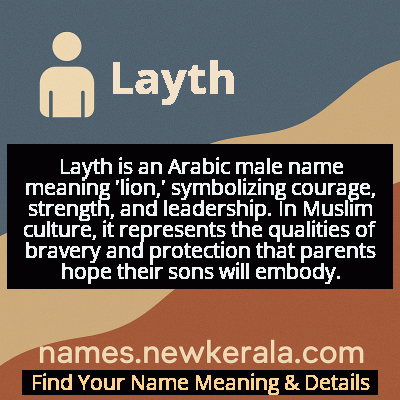Layth Name Meaning & Details
Origin, Popularity, Numerology Analysis & Name Meaning of Layth
Discover the origin, meaning, and cultural significance of the name LAYTH. Delve into its historical roots and explore the lasting impact it has had on communities and traditions.
Name
Layth
Gender
Male
Origin
Muslim
Lucky Number
3
Meaning of the Name - Layth
Layth is an Arabic male name meaning 'lion,' symbolizing courage, strength, and leadership. In Muslim culture, it represents the qualities of bravery and protection that parents hope their sons will embody.
Layth - Complete Numerology Analysis
Your Numerology Number
Based on Pythagorean Numerology System
Ruling Planet
Jupiter
Positive Nature
Optimistic, inspirational, and creative.
Negative Traits
Scattered, exaggerating.
Lucky Colours
Yellow, gold, purple.
Lucky Days
Thursday.
Lucky Stones
Yellow sapphire.
Harmony Numbers
1, 2, 9.
Best Suited Professions
Arts, writing, communication.
What People Like About You
Creativity, optimism.
Famous People Named Layth
Layth ibn Sa'd
Islamic scholar
Renowned Egyptian scholar and jurist, one of the most respected early Islamic scholars
Layth al-Jadeed
Military commander
Abbasid military leader known for his campaigns in the Byzantine frontier
Layth Al-Majali
Jordanian politician
Prominent Jordanian political figure and tribal leader
Layth Al-Momani
Businessman
Successful Jordanian entrepreneur and business leader
Name Variations & International Equivalents
Click on blue names to explore their detailed meanings. Gray names with will be available soon.
Cultural & Historical Significance
In contemporary Muslim culture, Layth maintains its traditional appeal while adapting to modern sensibilities. The name bridges generations, connecting modern families to their cultural heritage while remaining relevant in today's globalized world. It's particularly popular among parents who wish to give their sons a name with strong Islamic and Arab roots that also carries universal positive qualities. The name's continued popularity across different Muslim-majority countries demonstrates its enduring cultural resonance and the universal appeal of its symbolic meanings.
Extended Personality Analysis
People named Layth are typically associated with strong, assertive personalities that command respect and admiration. They often exhibit natural leadership qualities, combined with a protective instinct toward those they care about. Their courage isn't just physical but extends to moral and emotional bravery - they're often willing to stand up for their principles and defend others. Layths tend to be determined and persistent, approaching challenges with the same focused intensity that a lion exhibits when hunting. They're often seen as reliable and trustworthy individuals who take their responsibilities seriously.
Despite their strong exterior, many Layths possess a balanced personality that includes loyalty, family devotion, and emotional intelligence. They often form deep, lasting relationships and are known for their generosity toward friends and family. Their leadership style typically combines authority with fairness, and they're often sought out for advice and guidance. While they can be competitive and ambitious, they usually channel these traits in positive directions, achieving success through hard work and integrity. The combination of strength and compassion makes Layths well-respected individuals in both personal and professional spheres.
Modern Usage & Popularity
In modern times, Layth continues to be a popular choice for Muslim parents worldwide, maintaining its traditional appeal while fitting contemporary naming trends. The name enjoys particular popularity in Arab countries like Jordan, Saudi Arabia, UAE, and Egypt, as well as in Muslim communities in South Asia and the West. Its relatively short length and easy pronunciation make it adaptable to various cultural contexts, contributing to its sustained popularity. Recent years have seen the name maintain a consistent presence in birth registries across Muslim-majority countries, with some fluctuations in popularity but no significant decline. The name's strong, positive meaning and cultural significance ensure it remains a timeless choice that bridges traditional values with modern sensibilities.
Symbolic & Spiritual Meanings
Symbolically, Layth represents the embodiment of noble strength and courageous leadership. The lion symbolism extends beyond physical power to encompass moral courage, dignity, and the ability to protect and provide. In many cultural contexts, the name symbolizes royal authority and natural leadership, reflecting the lion's status as king of the jungle. It also represents family loyalty and protection, as lions are known for their strong family units and protective nature toward their pride. The symbolic meaning includes resilience in facing challenges, the wisdom to lead effectively, and the strength to overcome obstacles. For many, the name carries spiritual significance, representing the inner strength needed to maintain faith and principles in difficult times.

